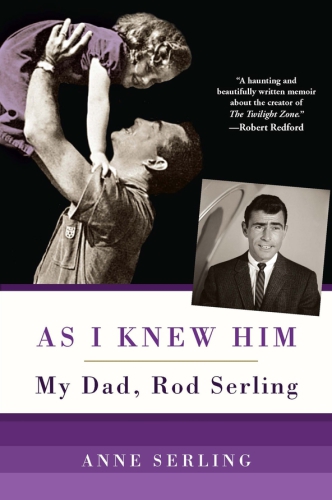
As I Knew Him
: My Dad, Rod Serling
کتاب های مرتبط
- اطلاعات
- نقد و بررسی
- دیدگاه کاربران
نقد و بررسی

May 13, 2013
According to his daughter, Anne, writer Rod Serling, the creator of the critically acclaimed television series, The Twilight Zone, was a caring, fun-loving father when he was not hard at work. Injured in combat during WWII, Serling turned to writing as a means of dealing with his trauma; consequently, his work had a strong moralistic streak that was, at times, fiercely critical of racism and discrimination. Having garnered the reputation of "TV's Angry Young Man" after seeing some of his work censored by the CBS Network, Serling turned to the sci-fi genre because, as he put it, "a Martian can say things that a Republican or a Democrat can't." Even as The Twilight Zone, which debuted in 1959, was in full swing, Serling managed to balance the hectic, if unhealthy, show business lifestyle, with quality time spent as a family man, best exemplified by family summers at their cottage in upstate New York. His death, due to heart attack at the age of 50, left the family, and in particular Anne, "floating through space where there is no logic, no gravity," but, as this memoir makes plain, in his life and art he is remembered fondly.

April 15, 2013
Exploring her deep bond with the creator of The Twilight Zone, the author delves into her father's writing career, his deep commitment to social justice and her grief following his death. Rod Serling (1924-1975) served proudly in World War II and then attended college. He began his writing career after winning a prize for a radio-show script, and he became a 1960s icon as host of The Twilight Zone: "the man in the dark suit standing against a dramatically lit set, intoning cautionary observations about human beings, fate, or the universe." But fame was radically different in those days, his daughter writes; celebrities were less afflicted by "the mayhem, the pandemonium, or the complete and disrespectful lack of privacy that exists now." During Anne's childhood, the family lived in Los Angeles for the school year and decamped for the summer to a cabin in upstate New York, where everyone could relax. At the end of its third season, The Twilight Zone was cancelled, and Serling began teaching at Antioch College. CBS later resumed the series for two more years, but Serling was less creatively involved with the show, though he still wrote some episodes. His liberal ideas affected his reputation with conservative TV executives, the author argues. Discrimination and prejudice were anathema to Serling, and it infuriated him when story ideas rooted in his principles were shunted aside in favor of simple entertainment. After writing some scripts for the TV show Night Gallery, for example, he complained to Universal Studios, "I have no interest in a series which is purely and uniquely suspenseful but totally uncommentative on anything." The author deftly utilizes correspondence to illustrate the bumpy interplay between her father's strong beliefs and the commercial imperatives of network TV, illuminating as well the political and pop culture of the turbulent 1960s. A piquant memoir blending lush memories of a remarkable father and adept analysis of his work.
COPYRIGHT(2013) Kirkus Reviews, ALL RIGHTS RESERVED.

April 1, 2013
Tuck away those chilling memories of postapocalyptic librarians and monsters hanging on to airplane wings. Serling's memoir of her father is an altogether gentler affair that forgoes backlot minutiae (Marc Scott Zicree's The Twilight Zone Companion, 1982, is your best bet for that) and instead focuses on the overworked but jolly man she knew as Dad. Rod Serling was 50 when he died from conditions exacerbated by his well-known smoking addiction, and Anne just 20, so it's no surprise her recollections are somewhat sepia-tinged. Family trips, rascally pets, and good-natured pranks dominate, with The Twilight Zone making sporadic appearances, mostly via intriguing insertions into the text to illustrate how details of Rod's personal life bled over into his scripts. Most affecting are Rod's letters home from the war, where he formed his virulent antiprejudice views and encountered demons that only a lifetime of writing could slay. The present-tense prose makes things a bit awkward (My dad is truly on his way), but for Serling completists this is a welcome alternative viewsubmitted for your approval.(Reprinted with permission of Booklist, copyright 2013, American Library Association.)

























دیدگاه کاربران